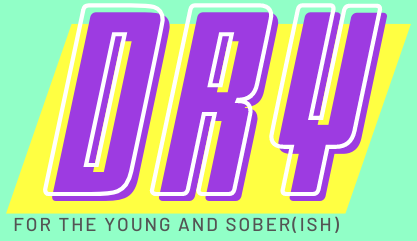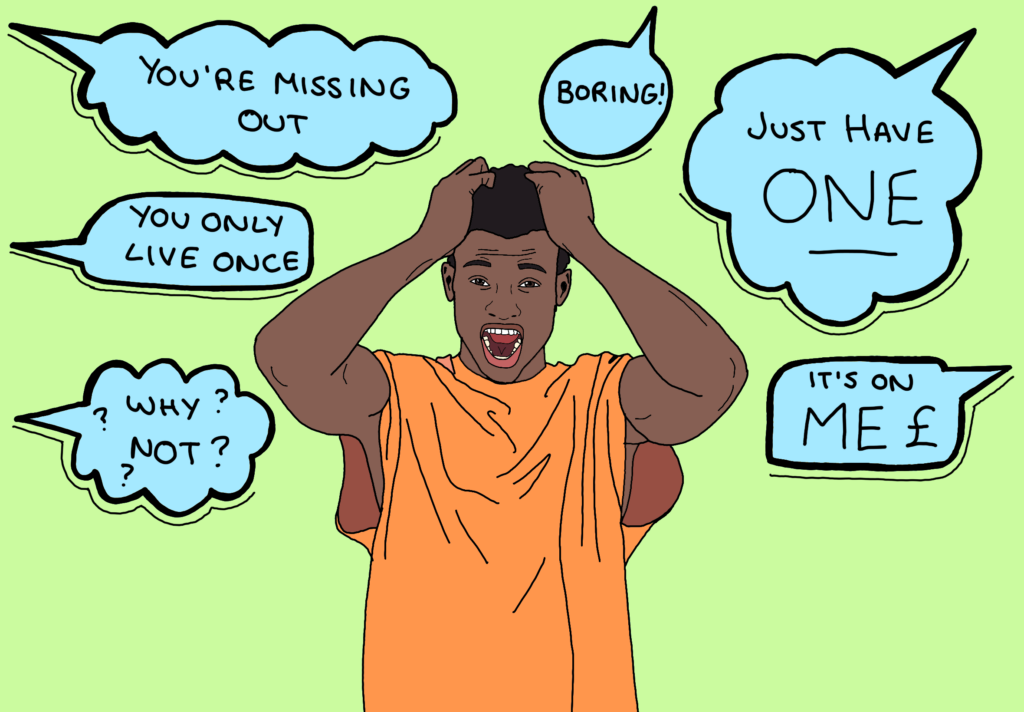Anybody who has dabbled in sobriety has heard it all before. “Why aren’t you drinking? Oh, come on, have one. You’ll have more fun. Don’t be boring!”
It’s like a broken record.
Alcohol and peer pressure go hand-in-hand. People’s inhibitions can decrease as they drink, making them more inclined to want others to match their level. In theory, these social scenarios should be fun and safe, but a survey conducted by Drinkaware unearthed some alarming figures.
Of the British drinkers surveyed, 57% reported wishing there was less pressure to drink; 21% of adults admitted to encouraging someone to drink more alcohol after they had stopped; one in five 18–34-year-old drinkers reported drinking more than they had intended, because they were ridiculed for not drinking enough.
Peer pressure most often happens among friends: a fact that 60% of participants attest to. In fact, one-in-ten drinkers aged between 18-34 reported losing a friendship because of this. Work socialising can be problematic, too, with 43% of drinkers agreeing that there is too much pressure to drink with colleagues.
It seems that many of us are guilty of pressuring friends to drink, but with more people choosing to reduce their alcohol intake, maybe it’s time to re-evaluate our attitudes towards others’ drinking.
Hannah, 23, a server from Leeds, told Dry about her own experiences of peer pressure and her concerns about drinking culture in the UK.
“I’ve never really been a big drinker and that’s a huge reason why I found university life difficult,” she says. “Some people rely on alcohol for a good time, and I didn’t realise the magnitude of this until I became a student. When people pressure others to go beyond their limits, that’s a really worrying and harmful habit.”
Hannah has seen alcohol being used as a way of excusing bad behaviour. “That has never sat right with me,” she explains. “If you’re with friends who pressure you to drink, that’s not a true friendship. I hope we can all learn to be more tolerant of people’s limits because they exist for a reason.” In light of her own experiences of social pressure, Hannah’s advice would be to find the right crowd to surround yourself with, even if it’s a crowd of one. “As long as you’re safe and comfortable,” she says.
Some people are guilty of applying the pressure on others to drink. Shamefully, I have been one of them. When I started university, it was rare for a student not to drink alcohol. For most of us, it was our first time away from home, so we spent a lot of time out drinking and partying. We all wanted to go wild and I didn’t understand when someone said they didn’t want to drink.
Regretfully, I would sometimes pressure my friends to drink more by offering to buy them drinks, or convince them that everybody goes to class hungover. I just wanted everybody around me to be having fun, so I could also let loose. Back then, it didn’t occur to me that alcohol isn’t essential to having fun. I still feel bad about pressuring friends to drink, but have learned from these experiences. These days, many of my friends don’t drink. I also don’t drink to excess anymore. It isn’t necessary to get blackout drunk.
If we are drinking on a night out, how should we behave towards non-drinkers who might also be at the table? According to a campaign started by Alcohol Change UK, ‘sober shaming’ can be avoided by simply not questioning people about their non-drinking. Also, by being aware of our own comments around sobriety. We can actively support our sober friends by offering to buy them non-alcoholic drinks during rounds, and by defending them when other people pressure them.
Julia Carson, author of Sober Positive, shared some tips with Alcohol Change UK about how to avoid peer pressure. “The best way to deal with it is to positively market your decision not to drink to people. Taking a break from alcohol is a hugely life-affirming thing to do,” she says. “Take pride in it and tell people that the lack of hangovers feels great and that you don’t feel like you’re missing out on a single thing. It’s harder for people to take the, ‘Oh, you could just have one,’ tactic when you’re saying how brilliant it feels to have none.”
Carson also encourages people to be mindful of FOMO (fear of missing out), suggesting we apply some logical thinking to counteract it: “It can be tempting to think that everyone else is off having a brilliant time without you but it’s quite simply not true. Everyone is living lives which are more or less like yours – they work, they shop, they parent. They clean the toilet and do the washing up. Very occasionally they get to kick back for a few hours with friends or family and if they drink while they do this, they’ll probably feel it the next day. That’s all.”
With overall alcohol consumption decreasing year-on-year, and more young people exploring sobriety than ever before, hopefully we are well on our way to a time where pressure to drink is a thing of the past and we can all let loose on the dancefloor together – drunk, tipsy or sober.
Illustration: Sophie Donne

